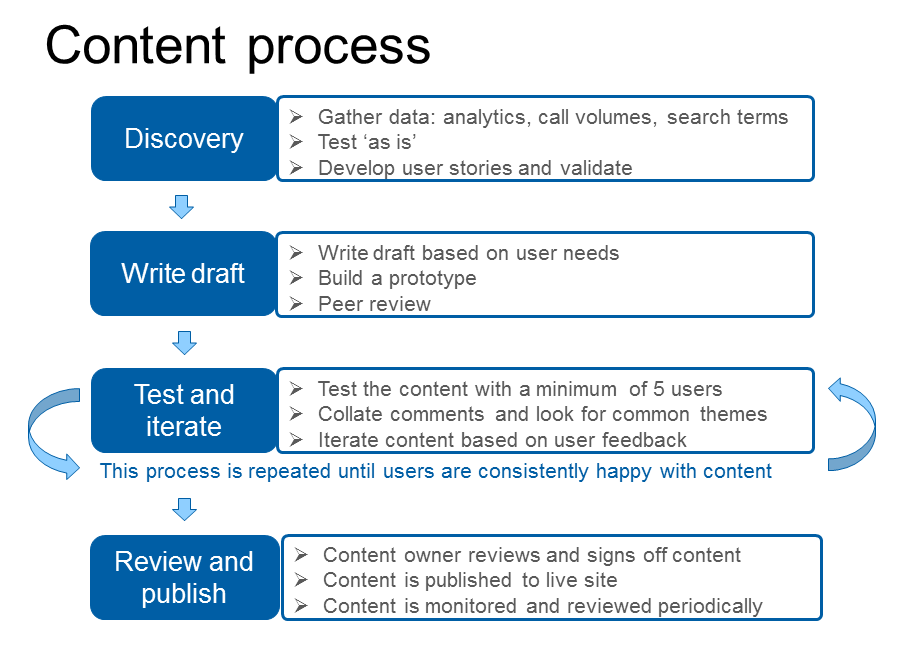At this week’s show and tell we heard about 2 pieces of work that showcased the ‘test, learn and improve’ approach that we try to take to all of our work. We heard from:
- Collette Parnell, who shared how we’re improving the way that we work with content owners
- Amy Ricketts from FutureGov, who presented a further update on the work she’s been doing on the ‘Organising care and support’ alpha service
A brief summary is below, but remember it's always better to attend the show and tell sessions in person if you can - no invitation is required - just drop us a note if you’d like more details.
Improving how we work with content owners
Over the last few months we’ve been working with services to redesign content on the essex.gov.uk website and Living Well Essex. In true ‘agile’ fashion, we want to learn from this process and improve the way we work with content owners in the future.
Every project will now start with a kick-off meeting involving the subject matter experts for the area we’ll be working on. The meeting will be supported by a one-page guidance document and a presentation to introduce the service design team and to outline our approach to redesigning content. It is also intended to help services understand how their content might change following a redesign.

By setting this out at the start of each project, we hope to:
- Establish a good relationship with content owners and subject matter experts
- Reduce the amount of time it takes for content to be redesigned, reviewed and published
- Introduce the new way of working where content is centred around user needs
These documents have already been through several iterations, and we’ve now tested them with some content owners. We showcased the presentation at this week’s show and tell to get feedback from attendees. The presentation was well received, and will now be rolled out for the next phase of content redesign. And as ever, we’ll refine it as we go.
Organising care and support
This show and tell was the final show and tell for the Organise care and support project in its alpha phase.
This has been a 6 month piece of work to design and test a new, user-centred service that aims to help people find and organise care and support themselves when leaving hospital.
The problem the team FutureGov were looking to solve was:
People's ability to find or arrange their own care and support or plan towards it is undermined by inconsistent and fragmented information and advice
Nowhere is this - inconsistent and fragmented information and advice - more apparent in hospitals, where without the help of skilled professional like a social worker or Home from Hospital Navigator, people are left to rely on leaflets and Google. This has an impact on people's ability to stay safe when going home and increases their chances of ending up back in hospital. It also has an impact on the number of people waiting to leave hospital (contributing to delays) and the likelihood of people needing council funded care (because they're not made aware of the alternatives or supported to find things that really suit their needs).
FutureGov were looking to test 3 aspects of the service:
- Desirability (do users need and want this?)
- Viability (will it deliver impact?)
- Feasibility (can the organisations deliver this?)
Testing the alpha started to prove the 3 following and biggest assumptions were true:
- That people are willing and able to organise their own care and support when leaving hospital
- There are staff in hospital who would have the time and skills need to introduce and support people to use the service
- The service will lead to better outcomes for end users and savings to health and social care
FutureGov are now preparing to help Essex take the work forward into Beta, which would aim to build a working version of the service based on the alpha prototypes in order to run a controlled test (a small numbers of users using a live service), to test the impact over a longer period.
So what did we learn?
It was another great turnout of this week’s show and tell - we really appreciate people taking time from their busy days to learn and engage in our work.
We’re finding it much better now that we only include 2 presentations as it leaves more time for conversation and making connections in the room.
In the discussion following Collette’s presentation one attendee asked how content owners have reacted to our efforts - so far people have been very positive, she explained.
Another attendee cautioned against considering user groups as homogeneous blocks: people living with dementia, for example, can have hugely differing experiences: their condition may change over time and vary considerably from person to person.
These sessions are an opportunity to learn about the work of the service design team, and to make connections between the work we are doing and your work. They are open to all, so drop us an email if you’d like to be added to the invitation list and feel free to forward to colleagues.
Leave a comment